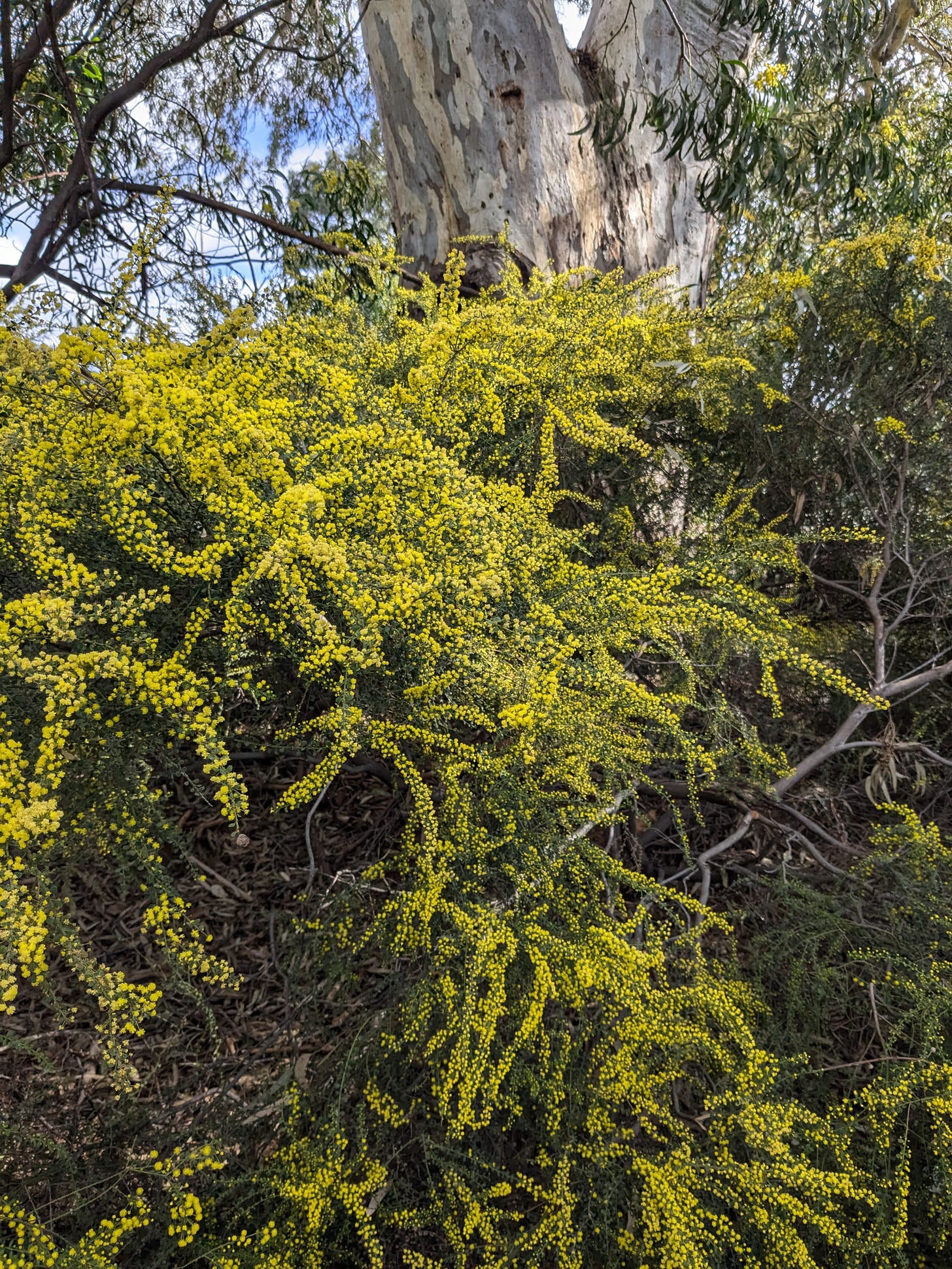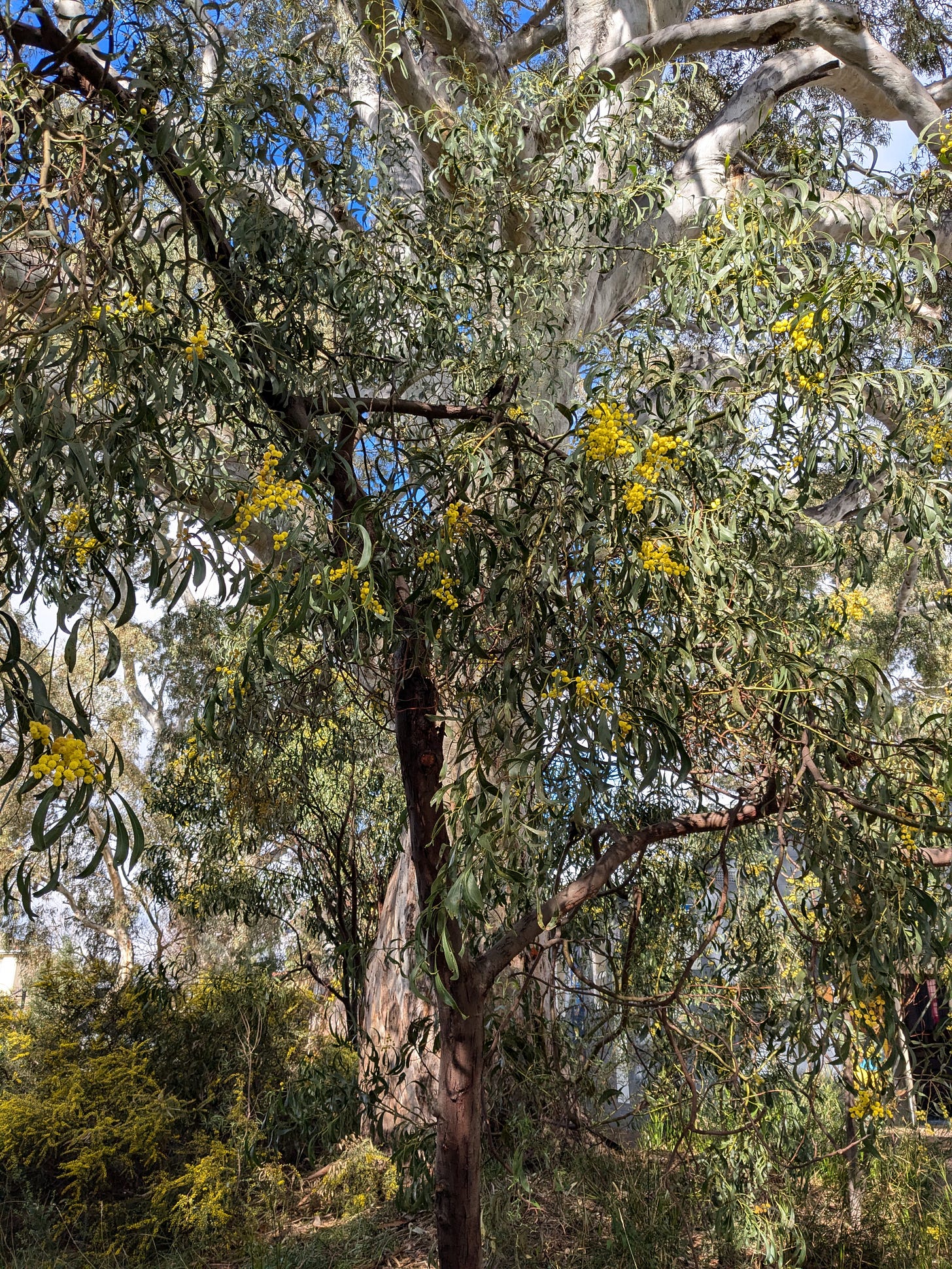Proustian reflections part I
On the road from the Mount: noble aspirations & wayward comparisons
Dear reader
Thank you for your patience with this newsletter. I trust you’ve been aching to read just as I have been to post. I’m going to try something different: splitting my thoughts on one subject across a series of posts. I intend to generate some momentum and commit to you, good friend of Wandering Words, to more regular broadcasting.
Please enjoy part 1 of *Proustian Reflections*.
Last week I drove from Mount Gambier to Adelaide. An enjoyable 5-hour trip back from the State’s easternmost outpost to the capital. I was fatigued and my throat was hoarse. I resolved to not pass the time on phone calls. Instead, I enjoyed the sunshine, the eucalyptus trees and vineyards of the Coonawarra, and the audiobook of Alain de Botton’s How Proust Can Change Your Life.
I was in a pensive mood, for a change; hooked by the promise of a changed life. 460km of bitumen provides one with a rhythmic monotony fit for contemplation. Alain de Botton (AdB) and Proust were perfect companions.
Marcel Proust was a French writer who gained fame at the very end of his 51 year life for a masterpiece called In Search of Lost Time.1 It is a novel seven volumes long. Most publishers rejected his manuscript because they thought it was a piss-take. No reader, they felt, would endure 40 pages describing a character’s inability to get out of bed in the morning. I know this would sound the death knell of my book club, for sure. It has suffered under the weight of much less.2
It took one cowboy publishing house on the verge of bankruptcy to put the work into print. They folded soon after but by then the Magic of Marcel had hit the streets of Paree.
Several things have captivated me about Proust. I will unpick one of them here and another in the coming days. My next task will be to read vol. 1 of his magnum opus, ‘Swann’s Way’.
Noble aspirations and wayward comparisons
Noble aspirations
Marcel was the son of a doctor renowned through Europe. Dr Adrien Proust had made a name for himself in epidemiology and hygiene to become an international authority in the early 1900s. He was a pioneer in his field and published broadly. He nevertheless held some positions that have aged very badly - as they tend to do in the natural sciences. One notable whammy is his belief that masturbation caused homosexuality. Concerned with the suspected persuasions of his son, he made a bid to intervene in his son’s sexual development by sending a young Prousty to a brothel with 10 francs.
De Botton writes that Dr Proust had an authoritative gaze and ‘exuded the moral superiority available to those in the medical profession, a group whose value to society is unquestionably apparent to anybody who has suffered so much as a tickly throat or a burst appendix, and which may hence provoke an uncomfortable sense of superfluity in those with less certifiably worthwhile professions.’
Marcel’s younger brother ‘The Ox’ went down the surgical route and perfected the art of prostate removal so much that in France the prostatectomy became known as the Proustatectomy. Wedged between two influential medicos, Marcel was a lost soul.
Having decided to forgo careers in law, medicine, the seminary and the diplomatic corps or, indeed, any other profession with a semblance of normality for a man of his time and standing, Proust hit despair at the ripe old age of 22. He floundered in his literary interests for several years, fudging his way through part time employment at a local library.
For Marcel, the weight of unworthiness next to his Father remained a crippling burden. It would take the death of his parents before he commenced working on his great contribution to literature. Even then he remained plagued by the following concern: ‘If only I could do with my books as much as my Father did for the sick.’
“Oh but you have!” I wish to go back and tell the delicate man. “Marcel, mon cherie, you are using the wrong criteria by which to judge your works!”
Alas, I must instead heed the message myself.
How do you make sense of the tragedy of Marcel living a life afflicted by guilt and shame, yet whose work received posthumous recognition as a portal into the mysteries of human experience? Would he have lived better knowing that his books would touch countless more people than a physician could in several lifetimes? Perhaps not. Maybe the fear of superfluity and uncertainty was the driving force behind the genius.
Wayward comparisons
The impression this section left on me was deep.
The idea that moral legitimacy is often afforded to those with certifiably valuable professional identities struck a chord.
As a child of two doctors with a hitherto pathological inability to commit to a vocation, this chapter had my jaw hanging above the worn leather steering wheel of my land cruiser. Insulated from the outside world by three tonnes of metal, I had no protection from AdB’s zingers hitting me between the eyes.
At no point is the intention to have a dig at Doctors. Instead, he is trying to paint a humorous picture of the difficulty many people face in seeking self-worth in their profession.
A familiar story? To me, yes. Whilst I have far humbler literary aspirations, I do know the struggle of binding your self-worth to professional endeavours. This has been a great trial in my last decade: finding a worthy alternative to medicine.
I took great solace in the tale of Proust, as told by AdB.
It precipitated a realisation that a subconscious driving force in my life has been a search for certifiable worthiness through professional activity. And to nobody’s great surprise, none of the gloves fit quite right!
By seeking work that is proxy for worthiness, I have been measuring things with a specific and unforgiving yard-stick that is actually not fit for purpose. Namely, external validation.
Looking outwards for validation of our worthiness is sure to deliver us to some kind of spiritual bankruptcy. Just as trying to forgo it altogether by removing ourselves from the world, is to flirt with egoism. I have experienced this first hand, wearing bangles and a scraggly beard while hiking along the Wild Coast of South Africa (a story for another time).
There is a middle path. Inspired by Marcel’s suffering, I have chosen to put aside the yard-stick. Suddenly the possibilities are endless.
I have learnt from Proust’s greatness and his suffering, that it is imperative that we honour our gifts and desires; and that we shouldn’t leave it so late to get out of our own way.
To be continued with Part 2: ‘The curse of the cliche’
Things I enjoyed last week.
Two bunches of poppies that have been slowly bending and blooming over our dining table. Their splendour is all the more remarkable for the appearance of the hairy bulbs before they burst (see below)…
The song “Messy” by Olivia Dean, which dropped at a conversational high point at a recent dinner party (my wife’s selection of the ‘This is Olivia Dean’ Spotify playlist hit hard). For me it evokes Sufjan Stevens and memories of my love affair with the Call Me By Your Name soundtrack in 2018.
The Gospel of Matthew. The seeming innocuous descriptions of Jesus’ movements have stunned me, eg. ‘On the same day Jesus went out of the house and sat by the sea.’ (Mt 13.1). There may be nothing to that line, or there may be everything. My heart aches reading it all the same. The simple beauty of this will be the subject of a post, or several. I suspect there is some Aramaic story-telling tradition at play.
Seeing Novak Djokovic’s outpouring of emotion upon winning the Gold Medal at the Olympics. I love that guy. Biased as I may be for a variety of reasons (Balkan Orthdodox solidarity). I’ve been riding his band-wagon hard since he broke onto the Aussie Open scene. Counter-intuitive as it feels to say having lived through the RF-Rafa era, he is the indisputable goat.
The acacia (wattle) flowers blooming all over the country. Timed impeccably in support of the Australian athletes in Paris.
Thank you for reading. Your time is precious and if you got this far, thank you.
With love,
Johnny
You will see from the Wikipedia short if you google search his name, that among his intellectual influencers was Honore de Balzac. A man whose reputation has been irreparably muddied. Try as I might, it has become impossible to take his name seriously, owing to countless memes repurposing it as a guide to well-executed fellatio.
Actually, my opinion is that whilst Eleanor Oliphant is Completely Fine is “less” in length, it is a far greater burden on one’s spirit.







Two words: fugg yeah!!!!!!!
Surely a missed opportunity to link poppies and hairy Balzacs ...